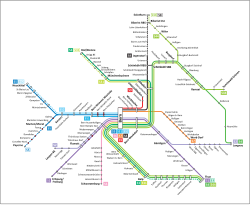Bern S-Bahn
 |
|||

A BLS S-Bahn train at Trubschachen
|
|||
| Overview | |||
|---|---|---|---|
| Locale | Bern, Switzerland | ||
| Transit type | S-Bahn | ||
| Number of lines | 13 | ||
| Daily ridership | 175,000 (weekdays) | ||
| Website | S-Bahn Bern (in German) | ||
| Operation | |||
| Began operation | 1974/1995 | ||
| Operator(s) |
BLS AG Regionalverkehr Bern-Solothurn (RBS) |
||
| Technical | |||
| Track gauge |
1,435 mm (4 ft 8 1⁄2 in) (BLS) 1,000 mm (3 ft 3 3⁄8 in) (RBS) |
||
|
|||
The Bern S-Bahn (German: S-Bahn Bern; French: RER Berne) is an S-Bahn commuter rail network focused on Bern, the capital city of Switzerland. The network is roughly coterminous with Bern's urban agglomeration.
With approximately 9 million train kilometres per year, the Bern S-Bahn is the second-largest S-Bahn in Switzerland. It handles around 100,000 passengers daily (175,000 on weekdays), and thus carries the majority of the agglomeration's regional public transport traffic.
As early as 1974, Regionalverkehr Bern-Solothurn (RBS) began operating S-Bahn-style clock-face schedule services in the Bern area. Since 1987, the company has run a cross-city regional service between Thun and Laupen/Fribourg.
In 1995, RBS started to designate its regional services as S-Bahn services. The existing cross-city line was designated as S1, and the designation S2 was given to a new cross-city line, between Schwarzenburg and Trubschachen.
The next expansion occurred in 1997, with the commissioning of the S3 (Biel/Bienne−Belp) and the S4/S44 (Bern–Bümpliz Nord−Burgdorf and beyond). In addition, the remaining standard gauge regional train services were designated as the S33, S5, S51 and S55 lines.
...
Wikipedia

